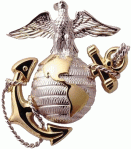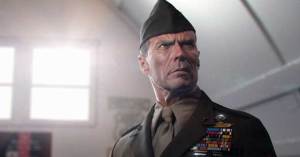The following is the first installment of what was originally titled A Burial at Sea: Remembrances of a Casualty Notification Officer. Written by Lt. Colonel George Goodson, U.S.M.C. (Retired) it was published in the Marine Corps Gazette in September 2007. Because of its length it’s divided here into three parts. Part 2 and part 3 will be published here over the next two days.
Written by Lt. Colonel George Goodson, U.S.M.C. (Retired) it was published in the Marine Corps Gazette in September 2007. Because of its length it’s divided here into three parts. Part 2 and part 3 will be published here over the next two days.
This story is a personal one, but shared with many from a unique perspective. It is one Marine officer’s 18-month long experience as he notifies the families of soldiers killed in Vietnam when casualties were on the rise. In 1967 — when this story begins — the U.S. saw the number of its soldiers killed increase from the year before by 81% to more than 11,000. The following year 1968 would be far worse. 16,592 American G.I.’s were killed that year. By the end of the Vietnam war nearly 53,000 would die. Unbelievably those numbers pale to those lost in the Civil War, but by today’s standards they’re difficult to comprehend.
It is one Marine officer’s 18-month long experience as he notifies the families of soldiers killed in Vietnam when casualties were on the rise. In 1967 — when this story begins — the U.S. saw the number of its soldiers killed increase from the year before by 81% to more than 11,000. The following year 1968 would be far worse. 16,592 American G.I.’s were killed that year. By the end of the Vietnam war nearly 53,000 would die. Unbelievably those numbers pale to those lost in the Civil War, but by today’s standards they’re difficult to comprehend.
Someone once said: A veteran is someone who, at one point, wrote a blank check made payable to ‘The United States of America’ for an amount of ‘up to and including their life.’ That is Honor, and there are way too many people in this country who no longer understand it.
What follows is shared in remembrance of all our veterans who have served our country faithfully. We especially honor those who gave the ultimate sacrifice and to the families they left behind. Thanks to Colonel Goodson for sharing his story.
Thanks to Colonel Goodson for sharing his story.
___________________________________________________
In my 78th year, the events of my life appear to me, from time to time, as a series of vignettes. Some were significant; most were trivial, and some were violent. War is the seminal event in the life of everyone that has endured it. Though I fought in Korea and the Dominican Republic and was wounded there, Vietnam was my war. Forty years have now passed, but I still think about the days when those of us in the Special Operations Group fought larger infiltrating elements of the North Vietnamese Army in Laos. When I think of my 18 months as a casualty notification officer, the vignettes are of disbelief, overwhelming grief, reluctant acceptance, and the solemnity of military funerals.
Return
I returned to the United States in late 1967 after 18 months in Vietnam. I landed at Los Angeles International Airport, visited the widow of a friend, flew to Indianapolis, picked up my wife and children, visited her family, and drove to Norfolk. I rented a house, enrolled my children in their 5th or 6th new school, bought a second car, and moved for the 13th or 14th time. I was as tight as a drum!
A week or two later later, I put on a uniform and drove the 10 miles to Little Creek, Virginia. I hesitated before entering my new office. Appearance is important to career Marines. I was no longer, if ever, a poster Marine. I had returned from my third tour in Vietnam only 30 days before. At 5 feet 9 inches I weighed 128 pounds – 37 pounds below my normal weight. My uniforms fit ludicrously, my skin was yellow from anti-malaria medication, there were bags beneath my eyes and I’m sure I had a twitch or two.
I took a deep breath, straightened my shoulders and walked into the office. A gunnery sergeant, his nameplate said Jolley, stood and announced, “Attention! Officer on deck!” I nodded and said, “As you were.” Everyone pretended to go back to work while watching me closely. Their professional futures were now in my hands. “Sergeant Jolley, I’m Lieutenant Colonel Goodson. Here are my orders.” Jolley responded, “Welcome aboard Colonel. We’ve been expecting you.” We shook hands. Jolley looked at my ribbons. “How long were you there, Colonel?”
stood and announced, “Attention! Officer on deck!” I nodded and said, “As you were.” Everyone pretended to go back to work while watching me closely. Their professional futures were now in my hands. “Sergeant Jolley, I’m Lieutenant Colonel Goodson. Here are my orders.” Jolley responded, “Welcome aboard Colonel. We’ve been expecting you.” We shook hands. Jolley looked at my ribbons. “How long were you there, Colonel?”
“Eighteen months this time.”
“You must be a slow learner Colonel.”
Everyone laughed. Jolley introduced me to the office crew. I shook hands with each and said appropriate things. All wore Vietnam ribbons. Jolley said, “I know that you and the sergeant major are old friends. I’ll take you to your office and bring him in.” “No, let’s just go to his office.” Jolley nodded, hesitated, and lowered his voice, “Colonel, the sergeant major has been in this job over two years. He’s packed pretty tight. I’m worried about him.” I nodded.
“No, let’s just go to his office.” Jolley nodded, hesitated, and lowered his voice, “Colonel, the sergeant major has been in this job over two years. He’s packed pretty tight. I’m worried about him.” I nodded.
Jolley led me to the sergeant major’s office. He knocked and we entered. Sergeant Major Walt Jones smiled broadly, stood, extended his hand, and we shook. “Hey, Colonel, good to see you again. Congratulations! I saw your name on the promotion lost.” I shook his hand and then we embraced. “Hello Walt, how are you, and how’s Joan?” Jolley raised an eyebrow, walked out, and closed the door quietly. I sat and we talked about mutual friends. Finally Walt said, “Bobby T. was killed.”
“Yeah, I Know.”
“How’s Betty holding up?”
“I saw her in Oceanside. She’s doing as well as can be expected. She and the kids are going home to North Carolina soon.” Walt looked at me with tears in his eyes. “Bobby was the son I never had. George, I’ve been in the Marine Corps since 1939. I was in the Pacific 36 months, Korea 14 months, and Vietnam for 12 months. Now I come here to bury these kids. I can’t do that anymore! I’m retiring.”
I was astonished! I’d known Walt since 1952 when I was a second lieutenant and he was a gunnery sergeant. Today we’d say he was my mentor. He’d always been a rock. Now I felt like the father of this 57-year-old man.
“OK, Walt. If that’s what you really want, put your letter in. I’ll endorse it favorably and do what I can to push it through Headquarters Marine Corps.”
A few weeks later, the sergeant major retired. He’d been a good Marine for 28 years, but he had seen too much death and too much agony.

####
Lt. Colonel George Goodson enlisted in the Marine Corps in 1951 and was trained as a demolitions specialist. Commissioned in 1952 he served in Korea, the Dominican Republic and Vietnam before retiring in 1974. Semper Fidelis; Always Faithful.
Installment 2 continues here.
℘